The Wisdom Buddha Protector of Je Tsongkhapa's Tradition
Spiritual Lineage
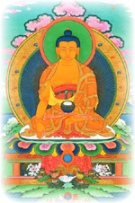
Buddha
Shakyamuni
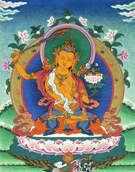
Buddha
Manjushri

Je Tsongkhapa
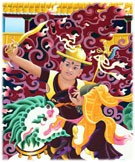 Wisdom Buddha
Wisdom Buddha
Dorje Shugden
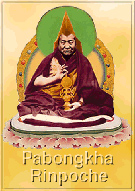
Pabongkha Rinpoche
(1878-1941)
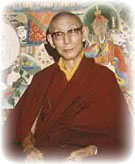
Trijang Rinpoche
(1901-1981)
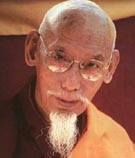
Song Rinpoche
(1904-1984)
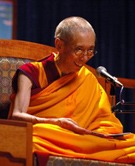
Geshe Kelsang Gyatso
(born 1931)
In the Dalai Lama's words
1. Speeches by the Dalai Lama and his Prime Minister Samdhong Rinpoche proving there is a ban
5. Comments to Buddhists barred from his teachings
6. Political speeches about the ban and threat to his health and life
7. "Religious" speech about the threat from worldly Deities to the cause of Tibet
8. Talk to monks at Trijang Labrang, the residence of His Holiness Trijang Rinpoche, the Dalai Lama's Junior Tutor
9. The Good Heart: A Buddhist Perspective on the Teachings of Jesus
Speeches by the Dalai Lama and his Prime Minister Samdhong Rinpoche proving there is a ban
"These monks must be expelled from all monasteries. If they are not happy, you can tell them that the Dalai Lama himself asked that this be done, and it is very urgent." - Dalai Lama talks to Tibetans
Sample excerpts from previous speech, March 27, 2006:
"Anyway, the issue is of critical concern to our Buddhist faith generally and regarding Tibet's Ganden Phodrang or government especially. Therefore what has been done benefits Tibet generally and because most of the concerned people have been able to make a proper choice between what to accept and what to reject in this matter, I felt an urge to thank you all for it. This activity which concerns the well being of our faith should not begin and end like the Chinese campaigns, which start suddenly to deal with an urgent current concern and then, after a while, calm down to eventually, sort of, die out. We should be able to carry forward to a successful conclusion the work that we have started in the matter.
I do feel that there are people there who are still strengthening their efforts to propagate the practice of Dorje Shugden. In the Dragyab region too, some such at the branch Dragyab Monastery and in the Markham region also, I feel that there are people who deliberately retain and propagate the practice. Denma Gonsar passed away last year. In the region where he lived too, there are people who continue and propagate the practice of Dorje Shugden. In the Rawatoe region of Nyethang there are among the monks and nuns coming to Lhasa from Markham, Dragyab, etc., people who propagate the practice. There are monks from the Markham region who have followed their tradition of joining the Ramoche Temple in Lhasa, where they are still propagating the practice of Dorje Shugden.
Whatever is the case, if such people are designedly reciprocating in negative kind the gratitude we owe to the successive Dalai Lamas and are thereby knowingly showing nothing but scorn for the religious and political causes of Tibet and the kindness of the Dalai Lamas, I have no suggestions to offer. If, nevertheless, I am reiterating my emphasis on the issue, it is because we need to hold as objects of compassion people, if any, who do not know about the issue, or who have not heard about it, or who, out of ignorance, have committed a rash mistake, or who have been led astray by others. All those who know about it have a duty to explain and thereby ensure proper conformity regarding what to accept and what to reject. I too take this as very important.
Do you understand? Within the lay and religiously ordained communities in exile those having connections in Tibet have the duty to advise and educate in a convincing manner people in Dragyab, Markham, Chamdo, Denma, and other problematic places as well as related other persons. It would be extremely tragic if in front of me, and, when I am giving the guidance, a person pretends to comply, only to betray hypocrisy when dealing with the reality. Do you understand?"
Compare these comments above to some of the Dalai Lama's teachings on love, compassion and tolerance, for which he is world-famous.
Recent exchange in Seattle, WA:
Asked Dave Matthews (musician): "How can you know what your enemy understands if you don't talk to them?"
The Dalai Lama responded that enemies can become friends through respect and respectful dialogue. Compassion can be extended to enemies, he said.
The Dalai Lama has refused every request, petition and plea for dialogue with respect to his ban of Wisdom Buddha Dorje Shugden.
At no time has the Dalai Lama or his government been open to discussing the issue. None of the reasons put forth by Abbots and other elders has been accepted or even considered. During a "religious" talk in Dharamsala, circulated by the exile government's Department of Information and International Relations, the Dalai Lama says:
"It is certainly possible that some of you senior spiritual masters, practitioners, monks and lay people have become unchangeable, like twisted tree trunks. It makes no difference to me. Those of you who are studying in the monastic colleges and universities, or wherever you live, think carefully. It is better not to be mistaken from the beginning. There are many young incarnate Lamas at this teaching today."
Here the Dalai Lama points directly at the 13-year old incarnation of his Junior Tutor Trijang Rinpoche, who taught him most of the Buddhism he now teaches to others and gave him the practice of Dorje Shugden.
"You too should think very carefully from the beginning. To rectify a mistake once it has been made is difficult. It is not good. The same goes for those in Tibet."
Comments to Buddhists barred from his teachings
The Dalai Lama bars Buddhist Dorje Shugden practitioners from teachings and empowerments that he liberally gives to thousands of non-Buddhists in the West. The religious reasons he gives repeatedly are that their participation will harm his life and health, but he gives no rational explanation for this, nor any evidence.
From an address delivered by the Dalai Lama at the preparatory session of Tamdrin Yangsang and Sangdrub empowerments, March 21 1996:
"Since it happens according to government oracles that Dholgyal (Shugden) relates to Chinese Buddhist deities, we actually mentioned him by name in our exorcism based on Tamdrin at that time. Tough these exorcisms cannot be relied upon, I have had strange dreams since then. Therefore I do not feel it will be comfortable for me to have worshippers of Shugden here. If acrimony between deities result in disharmony between humans, it will be spiritual ruination."
He goes onto explain:
"This will affect the life span of the spiritual master as well".
He then points out and praises those former practitioners of Dorje Shugden, including "abbots and spiritual masters", who have given up and "become pure".
He explains how he knows that Dorje Shugden is a Chinese spirit based on locals' dreams:
"Others have reported of a bearded monk strangling them: this is very clear indication that Shugden is a Chinese spirit, far from being a deity."
To those who might not have given up but refuse to leave, he asks them to publically make themselves known by standing up and leaving, saying:
"Not only will it not benefit yourself but in the worst case may even become the cause of shortening the life of the Dalai Lama. If you wish the speedy death of the Dalai Lama, then I have no objection."
He explains that he has reached these conclusions through divination (throwing a dough ball):
"All final decisions have been concluded only through divination. This address too is a result of a divination this morning."
He ends with a threat:
"If you private monks and spiritual masters in the monastic colleges continue making excuses and continue worshipping thus, you shall have a day of regret... it will not be good if we have to knock on your doors."
Political speech about the ban and threat to his health and life
In a public address in Dharamsala, May 5 1996, the Dalai Lama said:
"It may have been about ten years ago. While giving a lamrim [religious] teaching at Drepung Monastery, I once gave my reasons for issuing the ban."
On May 8, 1996 he continued:
"It has been twenty years since I first mentioned the Dorje Shugden public restriction".
The United Cholsum Organization in exile has increasingly assumed the role of policing conflicts and taking control of Tibetans by whipping up emotions, often using the name of the Dalai Lama. They quote the Dalai Lama:
"In his inaugural address to the Congress of the Cholsum Organization (3 provinces of Tibet), the Dalai Lama referred to his recurring sore throat. This is an indication that he does not wish to speak on this anymore, since no one is paying heed."
In response, Cholsum passed a resolution that its members would stop the practice of Dorje Shugden and the Dalai Lama remarked to members of the Cholsum Congress on March 4th,
"It is good that paying attention to my health you have passed a resolution regarding this matter. Danger to health does not exclusively mean an armed attack. This type is extremely rare in Tibetan society. If there is continued indifference to my injunctions, then there would not be any point in my continuing to live silently as a disappointed man."
Compare this to what the Dalai Lama says "officially" to Westerners:
"By defending those people who are persecuted for their race, religion, ethnicity or ideology, you are actually contributing to guiding our human family to peace, justice and dignity." Tibetan Bulletin, The Official Journal of the Tibetan Administration : January-February 1999, p. 29.
"Religious" speech about the threat from worldly Deities to the cause of Tibet
During a religious discourse on the stages of the path in Dharamsala, circulated by the exile government's Department of Information and International Relations, the Dalai Lama states again that there is discord between deities. This serves as the "spiritual" reason for his ban of Dorje Shugden, which he says was already proclaimed by the Thirteenth Dalai Lama on the basis of the Fifth Dalai Lama's secret visions.
"I have repeated time and again that sometimes there is discord between Tibetan deities. These statements I have made in the past still remain unchanged. I hope no one will imagine that there has been change in this regard."
"Whether outside of Tibet or within it, a deity in discord with government deities, whose relationship with the origin of this exile government at the time of the Fifth Dalai Lama is discordant, whatever may be the ultimate reality this is serious in the context of the common cause of Tibet. Therefore, unless I remind you once again, there are those who pretend they have not heard it. It will be the last resort if we have to knock on your doors. It would be good if you can heed this without us having to resort to this last step."
For a Tibetan, this is very strong language. The phrase, "It would be good, if...", is culturally understood to be an order with a strong warning of very serious consequences if not followed.
In the same talk, the Dalai Lama says, "Some people assume that I am saying not to rely on Dorje Shugden from an interpretive point of view and not a literal one. They act as if they knew what I mean. This is wrong. This is very important for all of you to know. Some were telling me not to say this, I am not saying it without thinking. I am saddened when requested not to address this topic. I am insisting on this labor of working for the cause of Tibet in the hope that at this bleakest point in the history of Tibetans I can share the suffering of my people and provide them some hope. Do you understand?"
It is understandable that ordinary Tibetans listening to such intense emotional appeals from the most important person in their lives became whole-heartedly motivated to act against anyone disagreeing with the Dalai Lama. Hence the mob mentality persecuting Dorje Shugden practitioners.
Compare this to the Dalai Lama's words in the West recently:
Associated Press, Berlin, May 19: The Dalai Lama urged 5,000 cheering spectators Monday to broaden their concerns for Tibet to encompass "every sort of human right violation..."
Gathered in front of Berlin's Brandenburg Gate, the exiled Tibetan spiritual leader said nonviolence was the right path.
"This century should be century of dialogue," he told the crowd. "Any problem can be solved through dialogue, not using force. That's very, very important."
Talk to monks at Trijang Labrang, the residence of His Holiness Trijang Rinpoche, the Dalai Lama's Junior Tutor
The Dalai Lama pays a visit to Trijang Labrang on 6 January 13th, 1999, the residence of His Holiness Trijang Rinpoche (1900-1981), his tutor. At a gathering of the Labrang's monks, the Dalai Lama says:
"During my visit to Switzerland, Lobsang asked that the current Choktul Rinpoche (Trijang Rinpoche's reincarnation) be allowed to worship Dorje Shugden like his predecessor, without a decision through the dough ball divination. He also told me that the ban on Shugden worship is causing widespread suffering to everyone, and that may it be revoked.
This is ridiculous talk. My reason for banning the Protector is in the interest of Tibetan's politics and religion, as well as for the Gelug tradition. In our face-to-face meeting, I also told Rinpoche to understand that we may be meeting each other for the last time."
During this private audience with the Dalai Lama, Ven. Choezed-la, the eldest official at Trijang Labrang, humbly points out that the religious ban has created an unprecedented atmosphere of hostility against both Shartse monastery and against Trijang Labrang, which is not very different from the atmosphere of the Cultural Revolution in Tibet. He requests that to lift the suffering within the Tibetan public from this atmosphere, would the Dalai Lama kindly consider revoking the ban.
To this, the Dalai Lama angrily replies:
"There will be no change in my stand. I will never revoke the ban. You are right. It will be like the Cultural Revolution. If those who do not accept the ban do not listen to my words, the situation will grow worse for them. You sit and watch. It will grow only worse for them."
The Good Heart: A Buddhist Perspective on the Teachings of Jesus
Compare all this to his tolerant words to Westerners (of which there are numerous examples):
"One cannot eat a particular food and then say, "Because it is nutritious for me, everyone must eat it"; each person must eat foods that are suitable for the best physical health according to his or her own physical constitution."
Political Leader
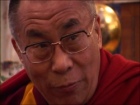 Dalai Lama
Dalai Lama
The Hypocrisy
Follow the story of the Dalai Lama's 30-year political campaign to destroy a centuries-old spiritual tradition taught to him by his own Spiritual Guide, and the efforts of those he's hurting to stop him:
Brief summary
- What is happening
- What is the Western Shugden Society (WSS)?
- Detailed reports of discrimination from inside India and elsewhere
The Dalai Lama's position
- A Great Deception
- Praise to Wisdom Buddha Dorje Shugden by the Dalai Lama
- In the Dalai Lama's words
Why is this happening?
- Why is this religious suppression taking place?
- Are the Dalai Lama's reasons valid?
Efforts to restore religious freedom
- Geshe Kelsang's open letter
- The ban is illegal and unconstitutional
- Press reports and videos
- Dorje Shugden Devotee's Charitable and Religious Society
- Dalai Lama sued for repressing religious freedom
- A conflict with a solution
- Announcement from Serpom Norling Monastery
Analysis of situation
- Sectarianism
- Can the Dalai Lama ever make a mistake?
- Is the Dalai Lama the only spiritual leader in Tibetan Buddhism?
- Theocracy or democracy?
- Spirit worship or authentic Buddhist practice?
- Freedom of worship
- The Dalai Lama's justifications
- Analysis by Dalai Lama's translator (PDF)
- What would Thomas Jefferson think of the 14th Dalai Lama?
- Book Reviews
- Videos
Evidence and first-hand accounts
- Chronological background
- Discord in exile documentary
- Political motivations for the ban
- Summary to date from Tibetan exiles
- Other
Ongoing persecution 2008-2010
- Recent vote sticks and call for help
- Forced signature and ID card campaign
- Persecution of monks at Sera Monasteries
- Public humiliation and explusion of monks
- Letter to Indian Prime Minister regarding abuses
- Letters from Dorje Shugden Devotees
- Urgent appeal from Sera Monasteries
- Support from Indian police
- Western Shugden Society letter to Sera monasteries
- Western Shugden Society letter to TGIE
- Heartfelt request from monks in Mundgod
- More discrimination planned around the world
- Letter from an FPMT monk
- Other
- What you can do